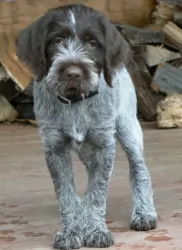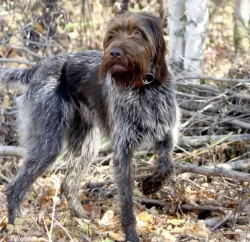 MyDogBreeds
MyDogBreeds Wirehaired Pointing Griffon is originated from France but Morkie is originated from United States. Wirehaired Pointing Griffon may grow 30 cm / 12 inches higher than Morkie. Wirehaired Pointing Griffon may weigh 21 kg / 47 pounds more than Morkie. Wirehaired Pointing Griffon may live 3 years less than Morkie. Wirehaired Pointing Griffon may have more litter size than Morkie. Wirehaired Pointing Griffon requires Moderate maintenance. But Morkie requires Low maintenance
Wirehaired Pointing Griffon is originated from France but Morkie is originated from United States. Wirehaired Pointing Griffon may grow 30 cm / 12 inches higher than Morkie. Wirehaired Pointing Griffon may weigh 21 kg / 47 pounds more than Morkie. Wirehaired Pointing Griffon may live 3 years less than Morkie. Wirehaired Pointing Griffon may have more litter size than Morkie. Wirehaired Pointing Griffon requires Moderate maintenance. But Morkie requires Low maintenance
 Known also as the Korthals Griffon, the Wirehaired Pointing Griffon is a hunting- and gundog. It was Eduard Karel Korthals who is thought to have brought about this dog breed around 1873.
Known also as the Korthals Griffon, the Wirehaired Pointing Griffon is a hunting- and gundog. It was Eduard Karel Korthals who is thought to have brought about this dog breed around 1873.
He was a Dutchman living in France. It is believed that quite a few dog breeds were used to bring about this dog such as the Otterhound, Spniels, Setters and possibly a Pointer. The dog is known as a supreme gundog and it is a very popular dog breed.
Edward Korthals of Holland was looking for an ideal gun dog. It was in 1888 that the first Griffon Club was formed. It was only in 1916 that this dog was officially recognized as the Wirehaired Pointing Griffon in the United States.
 These cute little dogs originated in the United States. As a cross between a Maltese Poodle and Yorkshire Terrier, the idea of breeders was to bring out a gorgeous looking little dog that would be low shedding.
These cute little dogs originated in the United States. As a cross between a Maltese Poodle and Yorkshire Terrier, the idea of breeders was to bring out a gorgeous looking little dog that would be low shedding.
The Morkie Poo inherits this low shedding characteristic from the poodle side of things. It is not precisely clear as to when the first Morkie was born, but these days he is as popular as ever.
Certainly, both the parent breeds are recognized with kennel clubs but the Morkie isn’t.
 The Wirehaired Pointing Griffon or Korthals Griffon is a medium-to-large sized dog standing at between 50 and 60cm both male and female and weighing between 23and 27kg.
The Wirehaired Pointing Griffon or Korthals Griffon is a medium-to-large sized dog standing at between 50 and 60cm both male and female and weighing between 23and 27kg.
He has a wiry, somewhat harsh curly outer coat and a softer undercoat. The head is quite large. He has thick eyebrows and a beard. The eyes are brown with yellow irises.
This is a low-shedding dog. There are a few colors such as white and brown, white and orange but the coat is also steel gray with brown markings.
These dogs are intelligent and independent with a desire to please their owners. He is able to learn tricks and commands easily. They love their human families and want to be around them all the time.
It would be devastating for such a dog to find himself stuck in the backyard with no human contact. He is also not suited to cramped living conditions in the city but is essentially a country dog, especially since he has boundless energy.
As a family pet, he is playful, friendly, loyal, loving and gentle, behaving well with children and other pets. They’re not aggressive dogs but they make excellent watchdogs, barking if someone comes into their property.
 The small Morkie is a crossbreed, and this means you can’t be 100% guaranteed of the dog’s looks. They usually stand at about 24 – 30cm in height and weigh between 4 and 6kg.
The small Morkie is a crossbreed, and this means you can’t be 100% guaranteed of the dog’s looks. They usually stand at about 24 – 30cm in height and weigh between 4 and 6kg.
You also get the Teacup Morkie which is even smaller. The coat of the Morkie can become fairly long and is black, brown and tan.
This is a little crossbreed dog who simply loves spending time with his human family. He is loving and gentle and will get along well with other pets in the home as well as with children.
Some people are inclined to think that these little balls of fluff are a total walkover, but don’t be mistaken, as these cheeky, feisty dogs have attitude. They’re social and playful and love to be involved in games with the kids. Just make sure your children have been taught how to be gentle with a small dog like this.
He becomes very attached to his family and doesn’t want to be left alone for too long.
 The Wirehaired Pointing Griffon has always been a great hunting dog and he doubles as an excellent pet and companion as well.
The Wirehaired Pointing Griffon has always been a great hunting dog and he doubles as an excellent pet and companion as well.
This dog is extremely loyal to his human family and is friendly, intelligent, loving and affectionate, getting on well with children as well as other pets in the home.
He can reach 14 years of age and doesn’t often get sick, making him an all-round great pet and companion.
 Your Morkie is such a sweet dog, and that’s to be expected, coming from such sweet parent breeds.
Your Morkie is such a sweet dog, and that’s to be expected, coming from such sweet parent breeds.
He just loves his human family and is friendly and social as well as being loyal. He has quite a bit of attitude, and if you allow it, he’ll develop some horrible small dog syndrome characteristics, such as being snappy, whiny and barking.
Small though he is, training and socialization will do him the world of good and he then lives up to everything wonderful that Morkie dog owners have got to tell you about– playful, friendly fun-loving, jaunty, loving and the cutest little thing there is.
 To avoid ear problems, a Wirehaired Pointing Griffon's ears should be kept clean and dry. If you do detect redness inside the ear, it could mean he has an infection that will need to be treated.
To avoid ear problems, a Wirehaired Pointing Griffon's ears should be kept clean and dry. If you do detect redness inside the ear, it could mean he has an infection that will need to be treated.
 As a responsible dog owner it is to your benefit to be aware of some of the common dog illnesses that your Morkie can succumb too. Not that he is likely too, as with good care, these robust little dogs can live to be 15 years of age or so.
As a responsible dog owner it is to your benefit to be aware of some of the common dog illnesses that your Morkie can succumb too. Not that he is likely too, as with good care, these robust little dogs can live to be 15 years of age or so.
A dog's lifespan can certainly be impacted by the lifestyle they lead. Some of the common dog illnesses to look out for -
Parvo can be a killer, and that’s why your 8 week old puppy needs to have his parvo vaccination. You’ll find puppies in shelters and puppy mills that get parvo. Dogs contact parvo by coming into contact with an infected dog.
Symptoms include vomiting, diarrhea, lethargy and weight loss. Quick medical treatment can save your dog but it is better to ensure he doesn't get it in the first place. Other diseases that require vaccinations are hepatitis, distemper and rabies.
This is a tick-borne illness brought on by bacteria transmitted by deer ticks that attach to the dog. One of the symptoms is lameness in limbs and a loss of appetite. Without treatment, lyme disease can lead to kidney problems.
Prevent your dog getting bloat by ensuring he doesn’t get ravenous with one meal a day. He then wants to wolf his food down. Rather give him smaller meals that he eats slower to avoid bloat. The stomach swells and can actually twist. If your dog has an enlarged stomach, is restless, salivating and wanting to vomit, get him to the vet immediately.
 This dog loves his exercise, and if you live in the country so much the better. He will love to go hiking and swimming with you or running next to you as you go cycling. He also loves all kinds of rope- and ball games in the garden. It’s why this active dog isn’t ideal for life in the city.
This dog loves his exercise, and if you live in the country so much the better. He will love to go hiking and swimming with you or running next to you as you go cycling. He also loves all kinds of rope- and ball games in the garden. It’s why this active dog isn’t ideal for life in the city.
Spay or neuter your pet if you don’t want unwanted puppies. Don't do it too early. Speak to your vet about the procedure and about the health benefits that come from spaying and neutering a dog.
These are active dogs and they will require top quality food if they’re to remain healthy and active.
Always check the packaging to see what ingredients are present in your dog’s food. Some of the cheaper, more inferior brands can actually be harmful to your pet with their useless ingredients devoid of vitamins and minerals.
Some home-made food is good and this needs to be plain and free from spicy additives. Dogs have sensitive stomachs and anything unusual can cause them digestive problems.
 The Morkie is such a small dog so it won’t require much effort to brush him. Because the hair is thin and fine, you may want to brush him every day just to keep the silky hair from matting.
The Morkie is such a small dog so it won’t require much effort to brush him. Because the hair is thin and fine, you may want to brush him every day just to keep the silky hair from matting.
Many Morkie owners opt to have their Morkie’s trimmed at a professional dog parlor. Check around his eyes and check inside his ears to make sure both are clean and free from infection.
Little dogs always have trouble with their teeth, so make sure to check these regularly. Keep his nails trimmed too as if they grow long they can hook onto things and can cause injury.
The Morkie is an energetic little dog, but because he is small he isn’t going to require too much exercise. A walk now and then will delight him and some ball games indoors or outside. He is a dog that will settle happily into city- or country life, so long as he is with his beloved owner.
Morkies love their food and they can tend to gobble it up. Rather give your Morkie smaller meals than one main meal as he wolfs it down, causing digestive problems.
If you feed him kibble, make sure the packaging is marked for little dogs and make sure its the best there is to ensure he gets the right amount of minerals and vitamins in.
As a treat boil some chicken, brown rice, pasta and vegetables and chop it up very finely and add it into his kibble from time to time.
Make sure your Morkie can easily reach his bowl of fresh, cool water.